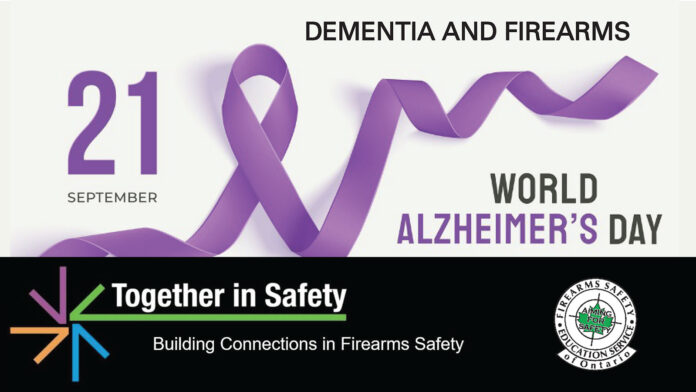September 21 is World Alzheimer’s Awareness Day.
According to the most recent data available, more than 402,000 seniors are living with dementia in Canada.
Firearms and other weapons can be found in households across the country. In most situations, their presence creates no problems for responsible gun owners and others in the household. However, firearms can pose a significant risk if someone in the home has Alzheimer’s or another dementia.
When there is a diagnosis of dementia, it can be difficult to have conversations regarding changes to lifestyle and living conditions. Following a dementia diagnosis, it is common for considerations to be made regarding legal, financial, personal care, and driving. However, the use of firearms and other recreational weapons (hunting knives, bows, fishing tools, fillet knives, etc.) should also be a part of planning for the future.
Giving up a firearms license may be hard for some people, especially those who live in rural areas and farms, and those licensed for occupational, recreational or sporting gun use. However, the effects of dementia can make continuing licensing and gun ownership dangerous for the person with dementia and others around them.
The progression of dementia means that the person living with dementia has an illness that affects their brain in ways that can result in:
– Poor decision making
– Distorted perception
– Forgetfulness
– Psychosis: delusions; hallucinations
– Personality changes
– Disinhibited behavior
Although other people may be aware of these changes, it is possible that the person living with dementia has limited insight into these problems. A person living with dementia risks injuring themselves or others.
Discussing the risks soon after diagnosis can provide an opportunity for the person living with dementia to identify their wishes for safety planning and plans for their belongings (firearms, firearms license and other recreational weapons).
Inform the person living with dementia of the need to discuss this with them, and ask them to invite others to join in the conversation (friends, family, hunting colleagues, professional care partners, etc.). Select a place and a time with the person living with dementia and focus on the facts and options available.
When you’ve reached the time to take away their car keys – that’s also a good time to remove firearms from the home.
“Together in Safety”, a partnership between Firearms Safety Education Services of Ontario, and the Chief Firearms Officer, are working with the Alzheimer Society of Ontario to bring awareness of the risk of firearms and dementia.
It’s time to have the conversation.
For more, read the Dementia & Firearms section at www.togetherinsafety.ca.






